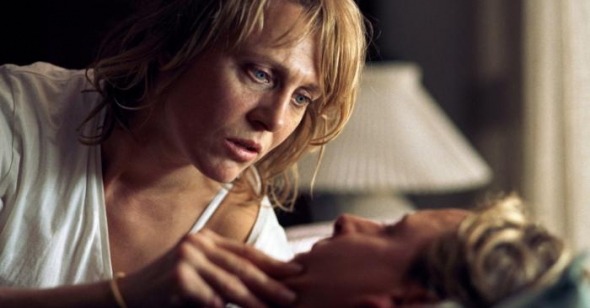Stolen Identity
by Jeff Reichert
Just Another Love Story
Dir. Ole Bornedal, Denmark, Koch Lorber Films
If youâre about to see a movie whose title is prefixed with the generic marker Just Another, odds are it wonât be âjust anotherâ anything except a strenuous exercise in subverting the tropes of said genre. This titular quirk may be just a function of rough translation, but Danish filmmaker Ole Bornedal (director of Nightwatchâboth the original and U.S. remake) lives up to his English title with Just Another Love Story, a coolly modulated mistaken-identity amour fou bruised and bloodied all over by healthy run-ins with familiar noir and thriller additives.
The filmâs opening jabsâbeginning-at-the-ending voiceover, quick elliptical edit work, a series of punctuating title cards introducing the trio of love stories weâre about to witnessâportend the kind of chillier form-conscious European take on Tarantino genre-revisionism weâve come to expect from the likes of Tom Tykwer or Nicolas Winding Refn. Just Another Love Story, which embraces the classicist underpinnings continental filmmakers often bring to bear in these situations (see: baroque camera angles, painterly compositions, classical music sprinkled liberally, an air of the downbeat), is generally competent enough to pass muster, and even though Bornedal doesnât reach the lurid heights of his American brethren, this isnât the soppy weak-kneed existentialism of Dominic Moll either.
Our hero for this outing is of the familiarly schlubby variety: Jonas (Anders Bertelsen), a married father of two who dreams of life beyond his grey box of a new Copenhagen apartment and harbors artistic ambitions that arenât fully satisfied by the photographs he takes as a crime-scene investigator. A freak roadway accident throws him into the orbit of mysterious brunette Julia, set up for us via voiceover as a classic femme fataleâsheâs headed away from somewhere, and in a hurry. Wracked with guilt at the damage caused by his jalopyâs breakdown, Jonas visits the comatose girl in the hospital and finds himself mistaken for her new boyfriend, Sebastian, by her anxious family. Uneasy (arenât they always?) at first about the masquerade, Jonas quickly slips into the role with a creepy relish.
Jonasâs friend on the force, Frank (Dejan Cukic), our requisite alcoholic wiseacre, chides his friend for getting himself caught in the farce but clears the way for deeper involvement via a little old-fashioned detective work: turns out the real Sebastian was murdered in Cambodia under âmysterious circumstances.â At the same time, Julia, whose initial prognosis portended a lifetime of respirators and bedpans, has come back to life. Thankfully for Sebastian/Jonas, she suffers from a whopper of a deus ex machina: blindness and memory loss. Jonas, tired of his family, ignores the flashing red lights of those pesky âmysterious circumstancesâ and wades right into a love affair and a new life. That all doesnât go according to plan shouldnât come as any great surpriseâremember that Bornedal, hewing close to genre roots, teed this one off for us in the filmâs opening shot.
Just Another Love Storyâs an odd case in that it only really gets under the skin when Bornedalâs working extremely hard and obviously against type. Iâm far more likely to remember an encounter between Jonas and Juliaâs doctor in an underground, inexplicably endless hallway, or the overpowering violins underscoring the impromptu ballet performed by Juliaâs sister upon her exit from the hospital, than the ragged stabs at intensity of the Sebastian-drug-soaked Angkor Wat hotel room sequences (eclipsed circa 1999 by Fiona Appleâs âCriminalâ video.) Luckily there are enough odd insertions to keep things moving along briskly through the standard genre beats. Itâs also hard not to admire how thoroughly Just Another Love Story weaves that often most-neglected strand of these fictionsâthe wife left behindâin and out of the story. The wife, Mette (Charlotte Fich), is so carefully and evenly drawn that, for once, youâre actually left questioning all the fuss around the storyâs supposedly undeniable, mysterious woman.
